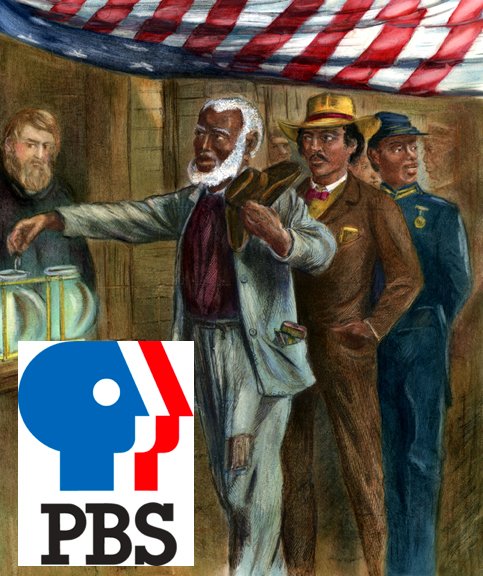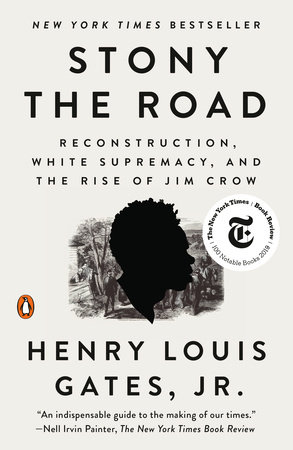get these nets
Veteran
duplicate
Last edited:

 and sadly it would take another 100 years or so for our civil rights to be fully acknowledged and protected
and sadly it would take another 100 years or so for our civil rights to be fully acknowledged and protectedcrap man I missed this

Today at the Television Critics Association Press Tour, PBS announced RECONSTRUCTION: AMERICA AFTER THE CIVIL WAR (w.t.), a new four-hour documentary executive produced and hosted by Henry Louis Gates, Jr., will premiere next spring on PBS stations nationwide. Professor Gates, the Alphonse Fletcher University Professor at Harvard University and director of the Hutchins Center for African and African American Research, will present the definitive history of one of the least understood chapters in American history - the transformative years following the American Civil War when the nation struggled to rebuild itself in the face of profound loss, massive destruction and revolutionary social change.
RECONSTRUCTION: AMERICA AFTER THE CIVIL WAR (w.t.) will take a broad view of the Reconstruction era and its aftermath, beginning with the hopeful moment of war's end and emancipation in 1865 and carrying through to 1915, when the nation was fully entrenched in Jim Crow segregation. In the aftermath of the Civil War, the nation was devastated by death and deconstruction. Members of the U.S. Congress endeavored to reunite North and South while granting citizenship rights to newly freed African Americans, in a plan started by President Abraham Lincoln prior to his assassination. Millions of former slaves and free black people sought out their rightful place as equal citizens under the law. The dream of an interracial democracy was brief, and the broken promises of the Reconstruction era haunt the country to this day. Though tragically short-lived, this bold democratic experiment was, in the words of W. E. B. Du Bois, a "brief moment in the sun" for African Americans, when they could advance and achieve education, exercise their right to vote, and run for and win public office.
"Reconstruction is one of the most important and consequential chapters in American history," said Gates. "It is also among the most overlooked, misunderstood and misrepresented. Our film will tell the real story of Reconstruction, honoring the struggle of the African Americans who fought their way out of slavery and challenged the nation to live up to the founding ideals of democracy, freedom and equality. But we will also tell the tragic story of the sustained and often violent pushback against Reconstruction's determination to secure equal rights for black people, and the subsequent RISE of white supremacy leading to the implementation of Jim Crow segregation. More than one hundred and fifty years later, this struggle continues."
The first half of the series will center on the pivotal decade following the Civil War rebellion, charting black progress and highlighting the accomplishments of the many political leaders who emerged to usher their communities into this new era of freedom. The series' second half will look BEYOND that hopeful decade, when the arc of history bent backwards. It became increasingly clear that many Southern white people were not willing to accept this new social order and that the federal government was not prepared to provide African Americans with consistent or enduring protection of their new rights. While tracing the unraveling of Reconstruction and the RISE of Jim Crow segregation in the closing years of the nineteenth century, the film will look at the myriad ways in which black people continued to acquire land, build institutions, and strengthen communities amidst increasing racial violence and repression. Less than thirty years after black men filled state legislatures, one by one, the Southern states began drastically restricting the vote while drawing a stark color line that DIVIDED white and black America.
The series will also explore the flowering of African American art, music, literature and culture as tools of resistance in the struggle against Jim Crow racism and the surge of political activism that marked the launch of such iconic civil rights organizations as the National Association of Colored Women, the Niagara Movement, and the NAACP, all at a time when black political power had been blunted and the dream of an interracial democracy seemed impossibly out of reach.
For those who don't know about Reconstruction:
You know I did.So, who has watched the entire doc.?
What was your overall impression?You know I did.
 but I found it and will check it out soon
but I found it and will check it out soon
Funny enough watched last night again on Youtube then saw this thread was bumped lolI somehow didn't know about thisbut I found it and will check it out soon



 .
.
For Black History Month, theGrio decided to track down the descendants of well-known African-American historical figures to find out what it is like being descended from some of most the influential people in American history. Here is what Helen and Michael Boulware Moore, the great-great grandson and the great granddaughter of Robert Smalls, had to say about the joys and burdens of bearing a famous ancestor’s legacy.
Robert Smalls is recognized as one of Civil War heroes who commandeered a confederate ship, the CSS Planter, freeing himself along with his enslaved crew and their families in 1862. He was also noted as one of the first black congressmen for South Carolina serving for five terms.
Both Michael and Helen Boulware-Moore run “The Life and Times of Congressman Robert Smalls: Travelling Exhibit.” Michael,50, says he is the “talking head” of the organization while his mother,76, runs the business side of the exhibit.
How did you find out you were related to him?
Helen: I’ve always known that. It’s like saying how did I know to breathe? Having lived with my grandmother, who is Robert Smalls’ daughter, she would talk about her mother and father and about their life. For the first 22 years of my life, she would tell me who was on the planter, when the planter was commandeered from the confederate army…I lived with [my grandmother] and I heard so many stories about ‘grandpa’ and the trip because she was on the planter at three years old.
Michael: It’s just been a part of my DNA for as long as remember. For us, when I think about the Civil War abstractly for our family, it’s Robert Smalls’ mission that’s very tangible for me. I have pictures of [Smalls’ daughter] ‘Mama Lizzie’ with my grandparents as I knew them. I slept in [Mama Lizzie’s] bed. My clothes would be her in dresser. All of this stuff sort of brings back this history; it just makes it much more real and tangible.
Even though Robert Smalls died long before I was born, his legacy, his story, the history is something that is really real and alive and it’s my job to keep it alive and pass it along to my children.
What is something people don’t know about Robert Smalls?
Helen: [People] don’t know the degree to which his work in this country was very much like the work of Martin Luther King. He was a person who was very interested in helping everyone. Clearly helping the formerly enslaved people who were in the low country of South Carolina but also helping others as well. [Smalls] and Harriet Tubman helping to establish schools for the formerly enslaved people after the emancipation proclamation.
Michael: What a brave and confident man he was. To commandeer a confederate ship, that took an enormous amount of audacity frankly and even he came back. He was one of the first real heroes of the Civil War, he could have gone north and lived out the rest of his days as a civil war hero…He was the first African-American to captain the U.S. military ship.
How are you or your family keeping Robert Smalls legacy alive?
Helen: I think the greatest thing I’m doing is the creation of the travelling exhibit. I have been working with the South Carolina State Museum, the largest museum in South Carolina to create this exhibit which has been travelling all around [the country] since Aug of 2008. Over 100,000 have visited so far!
Michael: I do lots of speaking engagements where I try to bring the story to life. For me, in terms of my family, obviously, my kids all know about Robert Smalls. They know their connection. They’re familiar with the story and his achievements. I try to make the story as real for them as it can be. It’s obviously more challenging with each successive generation. But it’s a gift for us to be connected to Robert and his legacy. As a parent, it’s my job to pass that gift along to them.
Is having his legacy a burden or an inspiration?
Helen: Absolutely an inspiration! If you look at the descendants you can see it because of what we have done educationally. Many of us are involved with education ourselves – gotten doctorate degrees, been physicians and ministers. I don’t feel that its pressure, it’s what expected…When you know who you are, and what your history has been then you have a sense of what is expected of you.
Michael: I think [that burden] is a great problem to have. The blessings of being attached to that legacy are so over-matched… I always kind of look back and compare my career with what Robert Smalls did. Have I really lived up to that legacy? And that can be burdensome at times and can be the source of some pressure. But I think that’s good pressure…having a connection to someone like Robert Smalls for me has given me confidence because I come from a legacy. I share the DNA of somebody who achieved extraordinary things against remarkable odds.
How would you hope Robert Smalls would be remembered today?
Helen: I think he is an unsung hero. Once again, it’s getting the story of Robert Smalls out to the public. I want [young people] to remember him as a ‘yes you can’ person. When we tell the story of Robert Smalls, we want [children] to be able to really understand that they have an opportunity. When they see a child who grew up enslaved, but ended his life as a five term United States congressman. If he can do it, than they can do it.
Michael: My ultimate message for young people is that Robert Smalls shows that in this country you can do a lot with a little… For young African-American youth who are faced with all kinds of challenges and obstacles, I think it’s important for them to know stories like Robert Smalls and they should feel proud that the role of their ancestors and people like them in history. It shows that if you can dare dream big dreams, but actually then gather yourself and go after them. Enormous things can happen.
I think Robert Smalls has for sure been under-served; his legacy has been under-reported or under-shared for a variety for reasons. Robert Smalls, I would put his resume up to anyone’s in history.
You're welcome.Thanks